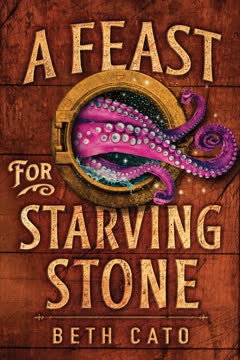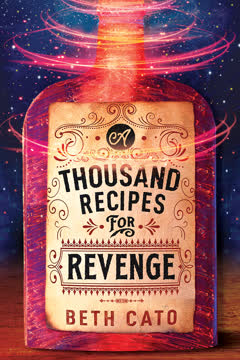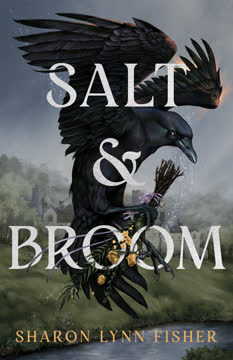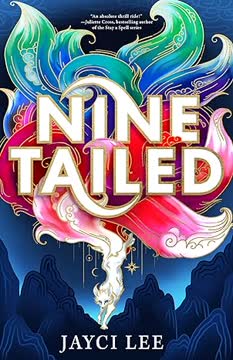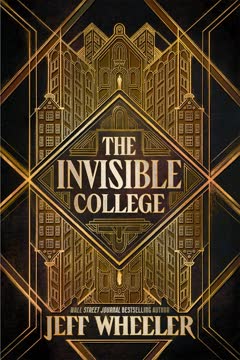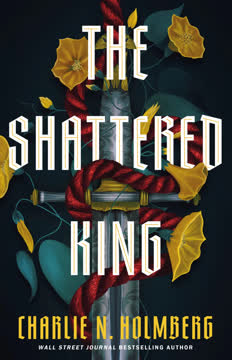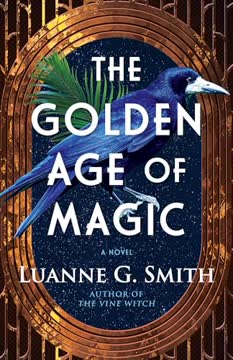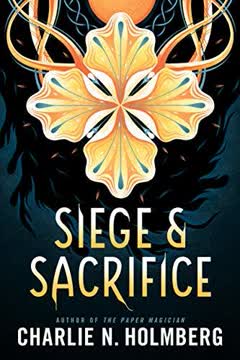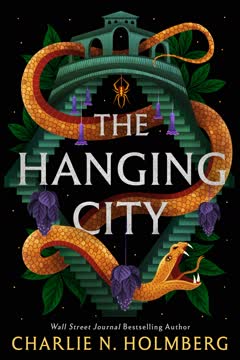Plot Summary
Gods' Gifts and Curses
In a world where the Five Gods bestow magic through food, rare Chefs are born with tongues that can sense and awaken the divine in ingredients. Yet, these blessings are double-edged: the same magic that empowers can also curse. Solenn, a Braizian princess, and Adamantine (Ada), a rogue Verdanian Chef, are bound by blood and fate, their lives shaped by the gods' whims and the politics of their nations. As war looms, the gods' gifts become both salvation and burden, and the lines between blessing and curse blur for mortals and immortals alike.
Poisoned Alliances Unravel
Solenn's arranged marriage to Prince Rupert is meant to heal the rift between Braiz and Verdania, but a poisoning at court shatters the fragile peace. Solenn's Chef abilities awaken, allowing her to sense the tainted wine and save Rupert—temporarily. When Rupert dies, Solenn is framed, and the alliance collapses. Ada, Solenn's birth mother, is drawn from hiding as old enemies resurface, and the gods' politics entwine with human schemes. The poisoning is not just a crime but a catalyst, setting off a chain of betrayals and revelations that threaten to plunge the continent into war.
Chefs, Kin, and Secrets
Ada's pursuit of her would-be assassins leads her to the heart of the epicurea trade, where she discovers that the magical ingredients she once revered are sentient kin, cursed by the gods to be food for humans. The kin, led by the Silvacane family, are both victims and potential allies. Ada's alliance with them is uneasy, as centuries of exploitation and misunderstanding come to light. The revelation that Chefs have been butchering intelligent beings shakes the foundations of her identity and the world's understanding of magic.
Tongueless Princess, Burning Home
Solenn, mutilated and voiceless after severing her tongue to escape the god Gyst's control, returns to Braiz as war erupts. Her home is beset by grief as the bodies of drowned sailors wash ashore, victims of Albion's aggression. Solenn's struggle to communicate and eat mirrors her country's struggle to survive. Yet, her empathy and determination grow, forging her into a leader who can bridge the worlds of humans, kin, and gods—even as she mourns what she has lost.
Divine Interventions and Grief
The gods' presence is felt in every aspect of life and death. Selland brings the dead home, Hester withholds warmth, and Gyst manipulates from the shadows. Solenn and Ada both experience the gods' capriciousness firsthand—sometimes as comfort, often as torment. The boundaries between divine and mortal blur, and the cost of divine attention becomes painfully clear. Grief, both personal and collective, is a constant companion as families and nations are torn apart.
War's Toll and Family Ties
As war intensifies, Ada and Solenn's paths converge and diverge. Ada risks everything to rescue Erwan, Solenn's father, from execution, while Solenn navigates the treacherous politics of Braiz and the kin. Family bonds are tested by secrets, lies, and the demands of leadership. The longing for home and the hope of reunion drive both women, even as they are forced to make choices that may doom or save their loved ones.
Kinship, Magic, and Betrayal
Solenn's diplomatic mission to the kin's realm, Arcady, is fraught with peril. She must convince Queen Abonde, the last dragon, to ally with Braiz against Albion, but the kin demand an end to the use of epicurea. The gods' curses and the kin's suffering are laid bare, and Solenn must navigate a web of ancient grievances and new betrayals. The alliance is fragile, built on trust that could shatter at any moment.
The Weight of Sacrifice
Solenn's struggle with Gyst, the god of secrets, culminates in a desperate act: she severs her own tongue to reclaim her autonomy. The act severs Gyst's hold but leaves her permanently changed. Ada, too, must confront the cost of power as she uses forbidden magic to save her family and city. The sacrifices demanded by the gods and by love are immense, and the line between self-destruction and heroism is razor-thin.
Dragon Wings Over Nont
Albion's forces, empowered by dragon epicurea and flying on wings made from slain kin, launch a devastating assault on Braiz. The city of Nont becomes a battleground, with Graecian fire and magical weapons threatening to consume all. Solenn, Ada, and their allies must fight not only Albion's armies but the legacy of exploitation and mistrust that divides humans and kin. The battle is as much for the soul of the world as for its survival.
Gyst's Games and Hester's Hope
Gyst's manipulations continue, sowing doubt and discord, while Hester, the god of hearth and home, is given a new voice through a stone avatar crafted by the kin. Solenn's faith in Hester and her willingness to forgive and trust the god become a beacon of hope. The gods' power is immense, but it is the choices of mortals—acts of compassion, courage, and sacrifice—that shape the outcome of the war and the future of magic.
The Siege of the Sea
The final battle for Braiz is fought on land, sea, and in the realms of gods and kin. Solenn rides Queen Abonde into battle, while Ada channels Hester's power to save Nont from destruction. The krakens, long revered and misunderstood, become crucial allies, their alien perspective and power turning the tide. The siege is not just military but existential, as the world's relationship with magic, the gods, and itself is remade.
Hester Incarnate Rises
Through Solenn's faith and Ada's courage, Hester is reborn in a new form, her voice restored and her power channeled to protect rather than destroy. The city of Nont is saved from Graecian fire, and the alliance between humans, kin, and gods is sealed in blood and hope. Yet, the cost is high: Hester's avatar is shattered in a final act of sacrifice, and the scars of war and loss remain.
The Price of Epicurea
Ada's use of Hester's powder to channel divine power is both salvation and danger. The allure of godly strength is seductive, threatening to consume her as it did others before. Yet, through self-awareness and the support of her family and allies, Ada resists the descent into addiction. The struggle to use magic responsibly, to honor the kin and the gods, becomes a central challenge for all who survive.
The Kraken's Bargain
Solenn's negotiation with the krakens is a test of empathy and imagination. The krakens' worldview is utterly foreign, and communication is possible only through images and feelings. Yet, through persistence and humility, Solenn forges a bond that allows the krakens to strike at the heart of Albion's power. The alliance is not one of dominance but of mutual respect, a new model for the world to follow.
The Fall of the Five
With Lord Whitney's death and the destruction of Albion's flagship, the old order of magic and power collapses. The gods' dominance is challenged, the kin's suffering is acknowledged, and the use of epicurea is renounced. The survivors must build a new world on the ashes of the old, one where magic is a gift, not a weapon, and where the bonds of family, friendship, and home are the truest sources of strength.
Homecoming Through Fire
Solenn and Erwan return home through Hester's fire, their journey a testament to faith, love, and the power of home. Ada, scarred but unbroken, finds healing in the rituals of cooking and the embrace of her family. The war's end is not a return to innocence but the beginning of a new, hard-won peace. The gods remain, but their power is tempered by the wisdom and compassion of those who have suffered and survived.
The End of Lord Whitney
The final confrontation with Lord Whitney is both personal and symbolic. Solenn and Erwan, aided by the krakens, bring an end to the architect of so much suffering. The victory is bittersweet, marked by loss and the knowledge that peace must be continually earned. As Braiz and Verdania face an uncertain future, the bonds forged in fire and blood offer hope for a world remade.
The Gods Among Us
In the aftermath, the survivors gather to rebuild, to remember, and to celebrate the simple joys of home and family. The gods are no longer distant arbiters but companions in the ongoing work of living. The lessons of sacrifice, forgiveness, and empathy endure, and the spark of hope—kindled by mortals and gods alike—burns on, lighting the way for generations to come.
Characters
Solenn
Solenn, the adopted Braizian princess, is the heart of the story—a young woman whose Chef abilities awaken at the worst possible moment, thrusting her into a maelstrom of political intrigue, divine manipulation, and personal loss. Severing her own tongue to escape Gyst's control, she becomes voiceless but not powerless, learning to lead through empathy, resilience, and diplomacy. Her journey from sheltered princess to ambassador between humans, kin, and gods is marked by sacrifice, courage, and a deep longing for home and family. Solenn's relationships—with her birth mother Ada, her father Erwan, and her kin allies—are fraught with secrets and pain, but also profound love. Her psychological arc is one of self-acceptance, as she learns to wield her unique gifts not as weapons, but as tools for healing and unity.
Adamantine (Ada) Garland
Ada is a woman defined by her contradictions: a Chef who has turned her back on her country, a mother forced to hide her identity, a warrior haunted by the cost of magic. Her empathetic abilities make her both powerful and vulnerable, and her discovery of the true nature of epicurea shatters her understanding of herself and her world. Ada's journey is one of atonement and redemption, as she risks everything to save her family and city, even at the cost of her own body and soul. Her relationship with Solenn is complex—a mix of pride, guilt, and fierce love—and her partnership with Erwan is a testament to enduring devotion. Ada's psychological struggle with addiction, power, and the burden of knowledge is central to her character, and her ultimate triumph is one of self-mastery and compassion.
Erwan Corre
Erwan is the steady presence in Solenn's life, a Braizian musketeer whose love for his daughter and Ada drives him to acts of quiet heroism. Torn between duty and family, Erwan's journey is one of endurance and sacrifice. He is a man who has lost much—his marriage, his comrades, his country's peace—but who never loses hope. Erwan's psychological resilience is matched by his humility; he is willing to follow, to lead, and to let go when necessary. His reunion with Ada and Solenn is bittersweet, marked by the scars of war and the promise of healing.
Queen Abonde
Queen Abonde is both ancient and vulnerable, the last of her kind and the leader of the kin. Her alliance with Solenn and Braiz is born of desperation and hope, and her willingness to risk everything for a new future is both inspiring and tragic. Abonde's psychological arc is one of grief and adaptation, as she mourns her lost kin and learns to trust those who once hunted her. Her relationship with Solenn is one of mutual respect, and her presence in battle is a turning point for the world.
Hester
Hester is a god defined by paradox: nurturing and destructive, hopeful and wrathful, present and isolated. Her curse upon the kin is the original sin of the world, and her own suffering mirrors that of those she has harmed. Through Solenn's faith and Ada's courage, Hester is given a new voice and a chance at redemption. Her psychological journey is one of humility and transformation, as she learns to value connection over power. Hester's relationship with mortals is fraught with danger, but also with the possibility of healing and renewal.
Gyst
Gyst is the shadow in every corner, the god who feeds on secrets and delights in ambiguity. His control over Solenn is both intimate and violating, and his games sow chaos and doubt. Yet, Gyst is not wholly malevolent; his actions force mortals to confront their own agency and the limits of divine power. Psychologically, Gyst represents the fear of the unknown and the temptation to surrender autonomy for certainty. His eventual loss of control over Solenn is a testament to the strength of human will.
Brillat Silvacane
Brillat is the patriarch of the Silvacane family, a kin who has suffered centuries of exploitation and mistrust. His alliance with Ada and Solenn is fraught with suspicion, but also with the hope of reconciliation. Brillat's psychological arc is one of guarded optimism, as he learns to trust those who once hunted his kind. His role as a mediator between worlds is crucial, and his willingness to risk himself for Erwan and Solenn is a mark of his evolving humanity.
Aveyron Silvacane
Aveyron, Brillat's son, is both horse and human, kin and companion. His friendship with Solenn is a source of comfort and strength, and his ability to navigate both worlds makes him an invaluable ally. Aveyron's psychological journey is one of self-acceptance and courage, as he embraces his dual nature and the responsibilities it entails.
August Chef Gurvan
Gurvan is the moral and spiritual center of Braiz, a Chef whose empathy and wisdom guide Solenn and Ada through their darkest moments. His relationship with the gods is one of reverence and skepticism, and his willingness to adapt to new truths is a mark of his greatness. Gurvan's psychological arc is one of humility and service, as he places the needs of his people above his own pride.
Lord Whitney
Lord Whitney is the architect of Braiz's suffering, a man whose brilliance is matched only by his cruelty. His use of epicurea and kin is a symbol of the old order's corruption, and his death marks the end of an era. Psychologically, Whitney represents the dangers of unchecked power and the dehumanization of others in the pursuit of victory.
Plot Devices
Magic Through Food
The central plot device is the world's unique magic system: all magic is derived from food, and only Chefs can awaken its full potential. This system is both a blessing and a curse, as it is revealed that the magical ingredients—epicurea—are sentient kin, cursed by the gods to be consumed. The narrative structure uses this device to explore themes of exploitation, addiction, and redemption. Foreshadowing is employed through the gods' interventions and the gradual revelation of epicurea's true nature. The use of food as both sustenance and weapon blurs the line between nurture and violence, and the struggle to use magic ethically becomes the story's moral core.
Dual Protagonists and Interwoven Narratives
The story alternates between Solenn and Ada, mother and daughter separated by secrets and war. Their parallel arcs—Solenn's rise as a leader and Ada's quest for redemption—mirror and inform each other. The interweaving of their narratives allows for rich exploration of family, identity, and the costs of power. The use of letters, recipes, and internal monologue deepens the psychological realism and emotional resonance.
Gods as Characters
The gods are not distant abstractions but active participants in the story, each with their own agendas, flaws, and desires. Their interventions drive the plot, but their power is limited by their own wounds and the choices of mortals. The narrative structure uses the gods to explore questions of fate, free will, and the possibility of change. Foreshadowing is achieved through prophecies, omens, and the gods' cryptic communications.
The Kin and the Coterie
The kin—sentient magical beings—are both victims and potential saviors. Their curse is the original sin of the world, and their alliance with humans is fraught with mistrust. The Coterie, led by Queen Abonde, represents the hope of a new order, one built on mutual respect and cooperation. The narrative uses the kin to challenge assumptions about power, otherness, and the ethics of magic.
Sacrifice and Transformation
Sacrifice is a recurring motif: Solenn's tongue, Ada's body, Hester's avatar, the kin's suffering. Each act of sacrifice is both loss and transformation, opening the way for new possibilities. The narrative structure uses these moments to mark turning points in the plot and the characters' development. The theme of home—what it means, how it is built, and how it is defended—anchors the story's emotional arc.
Analysis
Beth Cato's A Feast for Starving Stone is a lush, inventive fantasy that uses the language and rituals of food to explore the deepest questions of power, identity, and community. At its heart, the novel is a meditation on the costs and responsibilities of magic: who pays, who profits, and what it means to use power ethically. By centering the narrative on Chefs—those who transform the world through food—Cato invites readers to consider the ways in which culture, tradition, and exploitation are intertwined. The revelation that epicurea are sentient kin cursed by the gods is a powerful allegory for the hidden costs of privilege and the necessity of empathy and reform. The dual protagonists, Solenn and Ada, embody the struggle to reconcile love, duty, and selfhood in a world shaped by trauma and hope. The gods, far from being omnipotent, are wounded, fallible, and in need of forgiveness—a radical reimagining of divinity that places agency and redemption in mortal hands. The novel's ultimate message is one of hard-won hope: that through sacrifice, humility, and the courage to change, even the most broken worlds can be remade. The lessons of A Feast for Starving Stone—about the dangers of dehumanization, the necessity of compassion, and the enduring power of home—resonate far beyond its fantastical setting, offering readers a feast for both the mind and the heart.
Last updated:
Review Summary
A Feast for Starving Stone continues the exciting duology, following Princess Solenn and her mother Ada as they face war and magical challenges. Readers praise the unique world-building, food-based magic system, and character development. Some found the pacing uneven or the ending rushed, but most enjoyed the complex plot, diverse characters, and themes of compromise and empathy. The book explores PTSD, diplomacy, and alliances with magical beings. While a few readers felt it didn't match the first book's quality, most found it a satisfying conclusion.
